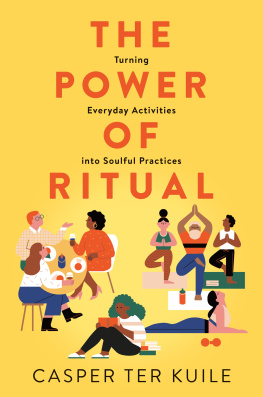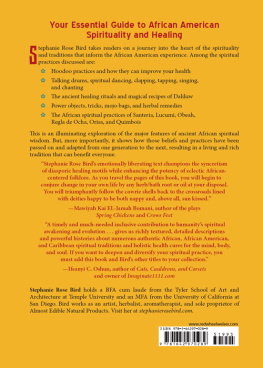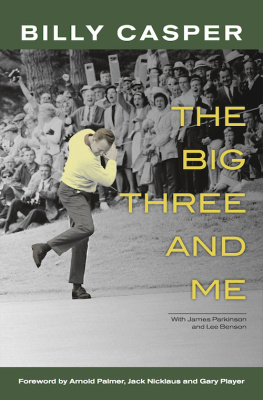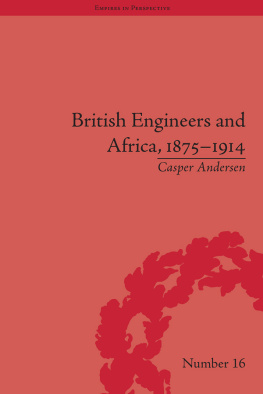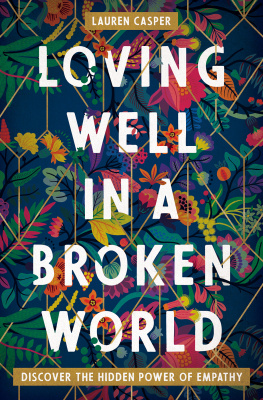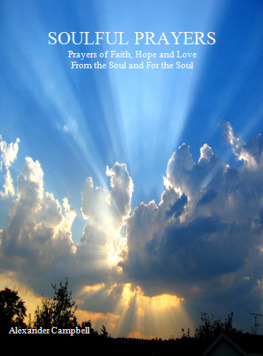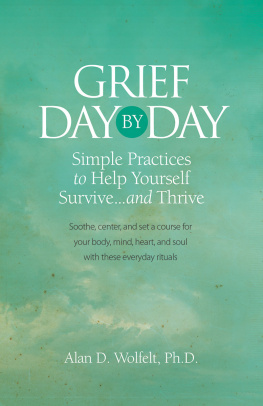Casper ter Kuile - The Power of Ritual: Turning Everyday Activities into Soulful Practices
Here you can read online Casper ter Kuile - The Power of Ritual: Turning Everyday Activities into Soulful Practices full text of the book (entire story) in english for free. Download pdf and epub, get meaning, cover and reviews about this ebook. year: 2020, publisher: HarperCollins, genre: Religion. Description of the work, (preface) as well as reviews are available. Best literature library LitArk.com created for fans of good reading and offers a wide selection of genres:
Romance novel
Science fiction
Adventure
Detective
Science
History
Home and family
Prose
Art
Politics
Computer
Non-fiction
Religion
Business
Children
Humor
Choose a favorite category and find really read worthwhile books. Enjoy immersion in the world of imagination, feel the emotions of the characters or learn something new for yourself, make an fascinating discovery.
- Book:The Power of Ritual: Turning Everyday Activities into Soulful Practices
- Author:
- Publisher:HarperCollins
- Genre:
- Year:2020
- Rating:3 / 5
- Favourites:Add to favourites
- Your mark:
- 60
- 1
- 2
- 3
- 4
- 5
The Power of Ritual: Turning Everyday Activities into Soulful Practices: summary, description and annotation
We offer to read an annotation, description, summary or preface (depends on what the author of the book "The Power of Ritual: Turning Everyday Activities into Soulful Practices" wrote himself). If you haven't found the necessary information about the book — write in the comments, we will try to find it.
Casper ter Kuile: author's other books
Who wrote The Power of Ritual: Turning Everyday Activities into Soulful Practices? Find out the surname, the name of the author of the book and a list of all author's works by series.
The Power of Ritual: Turning Everyday Activities into Soulful Practices — read online for free the complete book (whole text) full work
Below is the text of the book, divided by pages. System saving the place of the last page read, allows you to conveniently read the book "The Power of Ritual: Turning Everyday Activities into Soulful Practices" online for free, without having to search again every time where you left off. Put a bookmark, and you can go to the page where you finished reading at any time.
Font size:
Interval:
Bookmark:
To my father, who taught me
when to follow the rules,
and my mother, who taught me
how to change them.
Contents
W E LIVE IN AN ERA of fragmentation. Scholars have studied how our communitiesfamilies, churches, neighborhoods, work teams, and bowling leaguesare transforming. Once stable and enduring, now, as a result of economic and social forces, they are filled with people who have a more transient commitment to their jobs, locales, friendships, and marriages.
For deep and historical reasons, our sense of identity is now more fragmented, for better and worse. We have more complex and richer spiritual identities than in the past, more complex and richer gender identities, and more complex and richer ethnic identities. We are living in a globalized world.
There is much to praise in this era of fragmentation: the rise of rights and freedoms, the growing number of women in power, the democratization of art forms and information, and the glacial but accelerating move away from the homophobia, sexism, and racism that defined our recent history of colonial conquest.
But there is much to be concerned about, as well. People feel the absence of community. Studies find that the average citizen of the US, and likely the world, is lonelier than ever before. People have fewer friends. They spend inordinate amounts of time commuting in the car or scrolling through online feeds. People feel less trust toward their fellow citizens and work harder than before. The technologies many of us greeted with such enthusiasm a decade ago are now proving not to be the utopian, digital new world of connecting and sharing but a different kind of new world defined by anxiety, loneliness, endlessly comparing oneself to others, and perhaps surveillance. Our era of fragmentation has paved the way for an era of anxiety.
And this fragmentation has pronounced costs for the mind and body. As a professor of psychology, I teach the science of happiness at University of California, Berkeley, and beyond to hundreds of thousands of people in online courses, digital content, and my podcast, The Science of Happiness. Over the twenty years of this engagement, I have been asked one key question: How might I find deeper happiness?
The science points to an answer in the abstract: Find more community. Deepen your connections with others. Be with others in meaningful ways. Find rituals to organize your life. It will boost your happiness, give you greater joy, and even add ten years to your life expectancy, science suggests. Deep connections and the sense of community reduce levels of stress-related cortisol; they activate reward and safety circuits in the brain; they activate a region of the nervous system called the vagus nerve, which slows down our cardiovascular system and opens us up to others; and they lead to the release of oxytocin, a neurochemical that promotes cooperation, trust, and generosity. But I have been hard-pressed to point to deep, practical, principled ways to build connection, community, and a sense of ritual.
Now I can. In Casper ter Kuiles illuminating book The Power of Ritual: Turning Everyday Activities into Soulful Practices, we find a road map to greater meaning in life through community. A first step is through the creation of everyday secular rituals. Rituals, in my view, are patterned, repeated ways in which we enact the moral emotionsof compassion, gratitude, awe, bliss, empathy, ecstasythat have been shaped by our hominid evolution and built up into the fabric of our culture through cultural evolution. I learned this from Casper during the summer of 2018. He invited me into a ritualized experience of Saint-Germain-des-Prs, my favorite cathedral in Paris. Before entering the illuminated space inside, we circled around the building, clockwise, taking in the stream of sounds and images that meditative walking brings about. We then offered alms to a man begging at the entrance feeling the deep sympathies of charity. Before sitting in a pew, we genuflected and made a request and offered a quiet reflective thoughtprayerfor someone we care for. We took in the stained-glass windows and their patterns and colors, so reflective of the patterns and beauty of natureveins in leaves, colors of trees, reflections on lakes. Our attention moved up to the apse of the cathedral as though looking up to the clouds in the sky. We crossed ourselves in an act of quiet touch. Although I am not religious, these simple acts of rituallike those that run through this bookbrought me a feeling of calm, reverence, and even grace.
Rituals create patterns of the greatest capacities that I believe were given to us in the process of evolution and elaborated upon in our cultural evolution: our capacity to share, to sing, to chant, to revere, to find beauty, to dance, to imagine, to quietly reflect, and to sense something beyond what we see. Caspers book points to higher-order principles through which you can create more ritual in your fragmented life. Read sacred texts (this past June I reread Walt Whitmans Song of Myself, a sacred text in my family, and was moved again). Create sabbaths in your life, from work, technology, social life, and our frenetic, often overscheduled hours of the day. Find opportunities for what one might call prayermindful quiet forms of reflecting on love, gratitude, and contrition. Eat with others. Seek out nature, that universal source of transcending the self, that so often repairs, as Emerson observed, lifes calamities. In the spirit of our fragmented lives, Casper encourages us, through his broad, synthetic view of spiritual life, to weave together a fabric of rituals to bring meaning and community to our lives.
Casper offers perhaps a more challenging prospect, too: to awaken to the ritual and community that you are already instinctively creating in your social life. We have a biological need to belong, scientists have shown; without community, as in solitary confinement, we lose our minds. We seek out and create rituals with alacrity and force. For twenty years, I played pickup basketball until I depleted the cartilage in my knees. I played in nearly every city I visited, from Santa Monica, California, to Brockton, Massachusetts, to cities in France. I played with anyone. I was not even that skilled a player. And when I had to hang up my high-tops, what I missed most was not points scored or victories eked out, but the rituals that hold people together in pickup basketball: fist bumps, forms of protest and contrition, celebration and dance, ritualized patterns of five people moving together on a basketball court. It is sublime.
Caspers brilliant book challenges us to see and feel the rituals that are already part of our lives, to switch our minds to a community mind-set. It is likely happening in your spin class, on climbing trips, at musical concerts, when you shop for food, as you dine with your family, in the patterns of play, conversation, and celebrating and consoling on childrens soccer fieldsand even in how you might use your smartphone, in its better moments, to share photos, recipes, quotes, jokes, GIFs, memes, and news. After reading The Power of Ritual, I came to see how much ritual already ran through my daily life. And I felt lifted up.
Social, economic, and architectural forces, such as the rise of single-family housing, have made this an era of fragmentation. There is much to decry about that, and we feel it in the pains of isolation and loneliness. But there is much freedom and promise in this fragmentation, to create community and ritual in a richer and more complex fashion, one that honors and celebrates the diversity that is our species. The Power of Ritual points us toward this promise.
Dacher Keltner
Professor of Psychology, UC Berkeley
Font size:
Interval:
Bookmark:
Similar books «The Power of Ritual: Turning Everyday Activities into Soulful Practices»
Look at similar books to The Power of Ritual: Turning Everyday Activities into Soulful Practices. We have selected literature similar in name and meaning in the hope of providing readers with more options to find new, interesting, not yet read works.
Discussion, reviews of the book The Power of Ritual: Turning Everyday Activities into Soulful Practices and just readers' own opinions. Leave your comments, write what you think about the work, its meaning or the main characters. Specify what exactly you liked and what you didn't like, and why you think so.

